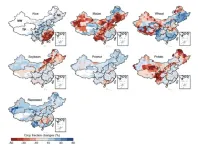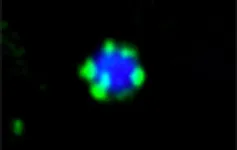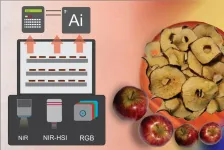(Press-News.org) -With images-
Scientists at Durham University have developed a theoretical framework to predict the efficacy of quenching of electrical pulses in excitable media, such as those found in the human heart.
This breakthrough could significantly accelerate the development of more efficient defibrillation techniques for treating cardiac arrhythmias.
The study, published in Physical Review E, addresses a longstanding challenge in understanding how stable excitation waves in systems like cardiac tissue can be effectively neutralised through small changes.
These electrical waves, when irregular, are thought to underly serious conditions such as fibrillation, where the heart fails to pump blood effectively.
The research provides a way to predict the smallest possible interventions required to restore the system to a stable resting state and permit the normal rhythm to reassert itself.
The study bridges a crucial gap in understanding how to disrupt harmful excitation waves with minimal energy input, especially in the earliest stages of defibrillation through direct intervention.
Lead researcher Dr Christopher Marcotte of Durham University's Department of Computer Science said: “Predicting how small changes to carefully tuned states develop over time underlies much of our understanding of complex phenomena, from turbulence to weather; similar predictions for dynamically robust states, like fully developed electrical waves in the heart, requires further insight into the larger structures of these systems and how they interact.
“By predicting the boundaries for efficacious interventions in the propagation of these electrical waves, we provide additional tools for defibrillation researchers.”
The team developed a linear theory capable of predicting ‘quenching perturbations’ - small changes that return an unstable system to its resting state.
This method improves upon traditional brute-force approaches by using computationally efficient semi-analytical techniques, inspired by similar approaches developed for the ignition — or starting excitation — of these waves.
This research focus on predicting suppression offers fresh insights into how to halt erratic electrical activity in tissues.
Using this framework, the researchers tested their predictions against various mathematical models of excitable media, including those simulating cardiac electrical activity.
The theory proved highly effective, showing qualitative and, in many cases, quantitative agreement with direct numerical simulations.
Defibrillation, the medical procedure to restore normal heart rhythms, typically involves applying a strong electrical shock to disrupt fibrillation.
This study opens the door to refining these techniques by targeting specific regions of the heart with smaller, more precise electrical pulses.
This could lower energy requirements, reducing the risk of tissue damage and making treatments more patient-friendly.
However, the researchers caution that quenching excitation waves is inherently more energy-intensive than initiating them as the latter rely on stored chemical energy in the tissue, which presents challenges for direct practical implementation.
Despite these challenges, the research findings lay the groundwork for innovations in low-energy defibrillation strategies and may augment emerging techniques like the Low-Energy Atrial Pacing (LEAP) method.
To encourage further exploration, the researchers have made their methodology and data openly available online. By providing access to their code, they hope to foster collaboration and spur additional advances in this critical area of medical science.
ENDS
Media Information
Dr Christopher Marcotte from Durham University is available for interview and can be contacted on christopher.marcotte@durham.ac.uk.
Alternatively, please contact Durham University Communications Office for interview requests on communications.team@durham.ac.uk or +44 (0)191 334 8623.
Source
‘Predicting effective quenching of stable pulses in slow-fast excitable media’, (2024), Christopher Marcotte, Physical Review E.
An embargoed copy of the paper is available from Durham University Communications Office. Please email communications.team@durham.ac.uk.
Graphics
Associated images are available via the following link: https://www.dropbox.com/scl/fo/zuit0szg9owxlpposjvjx/AF4cI5mdMYIQ8NVvUUkakIw?rlkey=s5utdelbhlx4cn4zl4y6n6tc7&st=3u7w2vii&dl=0
About Durham University
Durham University is a globally outstanding centre of teaching and research based in historic Durham City in the UK.
We are a collegiate university committed to inspiring our people to do outstanding things at Durham and in the world.
We conduct research that improves lives globally and we are ranked as a world top 100 university with an international reputation in research and education (QS World University Rankings 2025).
We are a member of the Russell Group of leading research-intensive UK universities and we are consistently ranked as a top 10 university in national league tables (Times and Sunday Times Good University Guide, Guardian University Guide and The Complete University Guide).
For more information about Durham University visit: www.durham.ac.uk/about/
END OF MEDIA RELEASE – issued by Durham University Communications Office.
END
Breakthrough Durham University research offers new insights into quenching electrical waves in the heart
Embargoed until 00.01 GMT on Wednesday 8 January 2025
2025-01-08
ELSE PRESS RELEASES FROM THIS DATE:
SLAC will play a key role in DOE’s new research centers for advancing next-generation microelectronics
2025-01-07
Around the globe day and night, the microelectronics behind much of modern technology help run computers, medical devices and state-of-the-art instruments that power scientific discoveries. But all of that technology consumes energy, and adding artificial intelligence to the mix increases our energy needs dramatically. Some experts caution that this pace of energy usage is unsustainable.
To tackle this challenge, the Department of Energy (DOE) has announced funding $179 million for three Microelectronics ...
Market researchers and online advertisers, are A-B tests leading you astray? A new study says they could be
2025-01-07
Researchers from Southern Methodist University and University of Michigan published a new Journal of Marketing study that examines platforms’ A-B testing of online ads and uncovers significant limitations that can create misleading conclusions about ad performance.
The study, forthcoming in the Journal of Marketing, is titled “Where A-B Testing Goes Wrong: How Divergent Delivery Affects What Online Experiments Cannot (and Can) Tell You About How Customers Respond to Advertising” and is authored by Michael Braun and Eric M. Schwartz.
Consider a landscaping company whose designs focus ...
Research alert: Ketamine use on the rise in U.S. adults; new trends emerge
2025-01-07
A recent study analyzing data from the National Survey on Drug Use and Health (NSDUH) found that past-year recreational ketamine use among adults has increased dramatically since 2015, including significant shifts in associations with depression and sociodemographic characteristics such as race, age and education status. Ketamine use has shown promise in clinical trials therapy for several mental illnesses, including treatment-resistant depression, and the new research suggests that ongoing monitoring of recreational use trends is crucial to balancing these ...
Crop switching for climate change in China
2025-01-07
A study of Chinese agriculture recommends planting areas currently growing maize and rapeseed with alternative crops to reduce environmental costs while maximizing food production as the climate changes.
Chinese food production has nearly doubled since the 1980s, mainly thanks to intensified nutrient usage and irrigation. Given that China’s demand for food is forecast to increase further, Qi Guan and colleagues modeled the country’s agricultural system under varying climate change scenarios in the 21st century, using a dynamic global vegetation model. The authors created scenarios ...
Cell-based therapy improves outcomes in a pig model of heart attacks
2025-01-07
BIRMINGHAM, Ala. – In a large-animal model study, researchers have found that heart attack recovery is aided by injection of heart muscle cell spheroids derived from human induced pluripotent stem cells, or hiPSCs, that overexpress cyclin D2 and are knocked out for human leukocyte antigen classes I and II. This research, published in the journal Circulation Research, used a pig model of heart attacks. Pig hearts more closely resemble the human heart in size and physiology, and thus have a higher clinical relevance to human disease, compared to studies in mice.
University of Alabama at Birmingham researchers, led by Jianyi “Jay” ...
Researchers have a better understanding of how our cells dispose of waste while developing ways to control it
2025-01-07
Recycling takes place in our cells at all times: in a process called autophagy, cell components that are no longer needed are enclosed by membranes and broken down into their basic building blocks. This vital process prevents the formation of harmful aggregates and makes nutrients available again. A research team co-led by Prof. Dr. Claudine Kraft from the CIBSS Cluster of Excellence at the University of Freiburg and Dr. Florian Wilfling from the Max Planck Institute of Biophysics in Frankfurt has now discovered the conditions necessary for autophagy to start. They were also able ...
Earth’s air war: Explaining the delayed rise of plants, animals on land
2025-01-07
New Haven, Conn. — If you like the smell of spring roses, the sounds of summer birdsong, and the colors of fall foliage, you have the stabilization of the ozone layer to thank for it. Located in the stratosphere, where it shields the Earth from harmful ultraviolet radiation, the ozone layer plays a key role in preserving the planet’s biodiversity.
And now we may have a better idea of why that took so long — more than 2 billion years — to happen.
According to a new, Yale-led study, ...
More than half of college students report alcohol-related harms from others
2025-01-07
FOR IMMEDIATE RELEASE
Tuesday, January 7, 2025
Contact:
Jillian McKoy, jpmckoy@bu.edu
Michael Saunders, msaunder@bu.edu
##
More than half of US college students experienced alcohol-related harms caused by others, according to the first national probability-based survey of such harms conducted in 20 years. The findings, published in the journal Drug and Alcohol Review in December, shed light on how others’ drinking affects students’ health, academics, and safety.
“Our research ...
Smart food drying techniques with AI enhance product quality and efficiency
2025-01-07
URBANA, Ill.– Food drying is a common process for preserving many types of food, including fruits and meat; however, drying can alter the food’s quality and nutritional value. In recent years, researchers have developed precision techniques that use optical sensors and AI to facilitate more efficient drying. A new study from the University of Illinois Urbana-Champaign discusses three emerging smart drying techniques, providing practical information for the food industry.
“With traditional drying systems, you need to remove samples to monitor the process. But with smart drying, or precision drying, you can continuously ...
Typical cost of developing new pharmaceuticals is skewed by high-cost outliers
2025-01-07
The typical cost of developing new medications may not be as high as generally believed, with a few ultra-costly medications skewing public discussions about the cost of pharmaceutical research and development, according to a new RAND study.
Using a novel method to assess spending on research and development for 38 drugs that were recently approved by the U.S. Food and Drug Administration, researchers found that the mean, or average, cost of developing a new drug was much higher than the mid-point (median) cost of development.
Researchers estimated a median direct research and development cost of $150 million compared to a mean of $369 million.
Costs ...
LAST 30 PRESS RELEASES:
Hope for global banana farming in genetic discovery
Mirror image pheromones help beetles swipe right
Prenatal lead exposure related to worse cognitive function in adults
Research alert: Understanding substance use across the full spectrum of sexual identity
Pekingese, Shih Tzu and Staffordshire Bull Terrier among twelve dog breeds at risk of serious breathing condition
Selected dog breeds with most breathing trouble identified in new study
Interplay of class and gender may influence social judgments differently between cultures
Pollen counts can be predicted by machine learning models using meteorological data with more than 80% accuracy even a week ahead, for both grass and birch tree pollen, which could be key in effective
Rewriting our understanding of early hominin dispersal to Eurasia
Rising simultaneous wildfire risk compromises international firefighting efforts
Honey bee "dance floors" can be accurately located with a new method, mapping where in the hive forager bees perform waggle dances to signal the location of pollen and nectar for their nestmates
Exercise and nutritional drinks can reduce the need for care in dementia
Michelson Medical Research Foundation awards $750,000 to rising immunology leaders
SfN announces Early Career Policy Ambassadors Class of 2026
Spiritual practices strongly associated with reduced risk for hazardous alcohol and drug use
Novel vaccine protects against C. diff disease and recurrence
An “electrical” circadian clock balances growth between shoots and roots
Largest study of rare skin cancer in Mexican patients shows its more complex than previously thought
Colonists dredged away Sydney’s natural oyster reefs. Now science knows how best to restore them.
Joint and independent associations of gestational diabetes and depression with childhood obesity
Spirituality and harmful or hazardous alcohol and other drug use
New plastic material could solve energy storage challenge, researchers report
Mapping protein production in brain cells yields new insights for brain disease
Exposing a hidden anchor for HIV replication
Can Europe be climate-neutral by 2050? New monitor tracks the pace of the energy transition
Major heart attack study reveals ‘survival paradox’: Frail men at higher risk of death than women despite better treatment
Medicare patients get different stroke care depending on plan, analysis reveals
Polyploidy-induced senescence may drive aging, tissue repair, and cancer risk
Study shows that treating patients with lifestyle medicine may help reduce clinician burnout
Experimental and numerical framework for acoustic streaming prediction in mid-air phased arrays
[Press-News.org] Breakthrough Durham University research offers new insights into quenching electrical waves in the heartEmbargoed until 00.01 GMT on Wednesday 8 January 2025





